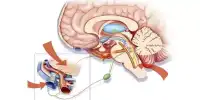If you’re battling with obesity or weight loss, you might have considered taking an over-the-counter appetite suppressant to help you eat less and eventually lose weight. Although these pills may appear to be too wonderful to be true, it is critical to conduct extensive research before beginning to take them. In fact, we recommend that you consult with a medical practitioner before using any supplement, even if it claims to be all natural. Let’s look more closely at what appetite suppressants are.
ETH Zurich researchers reveal that non-essential amino acids reduce appetite and increase the desire to move in mice tests. Their findings shed light on the brain mechanism that governs this behavior.
Proteins can reduce hunger, therefore a protein-rich diet can aid in weight loss. This is only one of the reasons why this type of diet has grown in popularity in recent years. ETH Zurich researchers have now established a new way by which the building blocks of proteins, amino acids, suppress hunger in mice. It is specifically concerned with non-essential amino acids.
There are nine amino acids that human bodies cannot make on their own out of the 21 that they require. They are referred to as essential amino acids. They have long been the focus of nutrition study because we must receive them through our diet. The remaining 12 amino acids are classified as non-essential. The body can produce them itself by altering other molecules.
We reveal that non-essential amino acids reduce appetite and increase the desire to move in mice tests. Our findings shed light on the brain mechanism that governs this behavior.
Professor Denis Burdakov
Shown in mice
It is well recognized that both essential and non-essential amino acids can reduce appetite. However, the manner of action of non-essential amino acids has not yet been shown in living creatures. Now, a team of researchers led by Denis Burdakov, Professor of Neuroscience at ETH Zurich, has demonstrated for the first time in a living organism that non-essential amino acids influence the brain in a way that reduces appetite and stimulates exercise.
The mice were first given either a mixture of several non-essential amino acids or a sugar solution containing the same number of calories (control group). Both groups of mice were subsequently given a milkshake, which they usually enjoy. While the control group drank copious amounts of it, the mice that had been fed non-essential amino acids avoided theirs. Instead, they went around their enclosure in search of alternative sustenance.

Rooted in evolutionary history
Additional studies enabled the researchers to understand the underlying mechanism, in which specialized nerve cells in the brain known as orexin neurons play a key role. Proteins consumed by mice are broken down in the intestines into amino acids, which subsequently enter the bloodstream. The blood then carries them to the brain. The orexin neurons in the hypothalamus have receptors that recognize non-essential amino acids specifically. As a result, they activate a neuronal circuit that results in the observed behavioral alterations.
This mechanism is most likely evolutionary in nature. “Today, we have adequate access to all nutrients and plenty of time to eat. That was most likely not the case when this mechanism evolved in prehistoric times “says Paulius Viskaitis, a postdoc in Burdakov’s group and the study’s lead author.
“At the time, it was advantageous for individuals to spend only a brief period of time at a food supply that mostly comprised of non-essential amino acids.” If eating non-essential amino acids increases the need to move, the animal may seek out other sources of food that may contain more vital nutrients and are therefore more significant to the individual.
Viskaitis emphasizes that the findings are applicable to humans and other animals since this mechanism impacts a part of the brain that has a long evolutionary history and is found in all mammals and many other species. Nonetheless, Viskaitis believes that for persons looking to lose weight, a diet high in non-essential amino acids cannot be suggested universally. Individual nutritional advice should be given, taking into account health concerns.
















